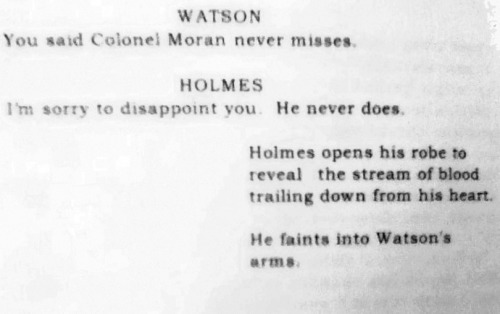(Sorry For Quality) From ‘Holmes & Watson’, By Lee Shackleford.

(Sorry for quality) From ‘Holmes & Watson’, by Lee Shackleford.
More Posts from Tworiversblog and Others



In the early 1930s, scholarly studies were done on the impact of screen stars on teenagers, because of fears that the movies were sexualizing them. These studies found that teenage girls learned sex techniques through watching Garbo’s sex scenes, especially those in Flesh and the Devil; they then practiced her techniques at home with their girlfriends. Raymond Daum described Garbo’s many young female fans as having “schoolgirl crushes on her” that “defined a national idolatry.” And knowledge of Garbo’s non-heteronormative sexuality was spread through lesbian networks “from coast to coast.” Moreover, the 1920s was an era of commercial expansion in which the ranks of saleswomen and typists, careers dominated by young women, increased. These women made enough money to see a movie more than once. They identified with female stars and liked to see them in powerful roles. Greta Garbo in Flesh and the Devil (1926)
Hi 👋, My name is Mohammad, and I’m reaching out in a moment of desperate need. I’m a father of three young children living in Gaza, and we are caught in the midst of a catastrophic war. Our home is no longer a safe haven, and the future here seems increasingly uncertain. 💔
I’ve launched a fundraising campaign with the goal of raising $40,000 to relocate my family to a safer place where my children can grow up in peace and have a chance at a brighter future.
Unfortunately, my previous fundraising efforts were abruptly halted when my account was terminated without explanation. However, I remain determined to keep fighting for my family’s safety and well-being. 🫶
If you could take a moment to read our story, consider donating, or simply share our campaign with others, it would make an incredible difference. Every act of kindness, no matter how small, brings us one step closer to safety and a new beginning. 🙏
Thank you for your time, compassion, and support. ❤️🩹
https://gofund.me/fd1faea2 🔗
This is really important!!


Knit Vests // Frankie Print Co




We were on location somewhere and he serenaded me at a restaurant table in the middle of a very crowded restaurant in the evening … and when he serenaded me, he really did serenade me. He wasn’t taking the mickey, it was absolutely serious as only Jeremy could be serious in a situation like that. I was sitting there, and suddenly his voice was floating out all over this restaurant, and he improvised this song all about me and my beautiful wife and my beautiful son. I was absolutely crimson with embarrassment. But it didn’t make me love him any the less. - David Burke on Jeremy Brett’s irresistible urge to sing
The thing about every modern Sherlock Holmes story is that it doesn’t understand that “disdain for the existing criminal justice system” is not only a fundamental part of the themes of the ACD stories it’s vital to making the whole concept work.
Holmes, when we first meet him, is on the bleeding edge of forensics for the 1880s, and this continues on into the ‘90s (the planted thumbprint in ‘The Norwood Builder’! the Sherlock Holmes test for hemoglobin in A Study in Scarlet! the use of pigs as substitute cadavers in ‘Black Peter’!) and beyond. He’s flippant about and disrespectful toward the police because he knows how criminology is a science and forensics matter and the cold hard facts are significantly more important than intimidating witnesses to extract coerced confessions, or deciding on a theory and bending the facts to make them fit, or relying on racist stereotypes to explain how people act and who’s most guilty (all things that really happen in the canon, btw). He’s smarter than everyone else because he’s doing things no one else understands yet, he’s made a study of crime and he understands how and why policing is a flawed institution.
This is why he’s not a cop, only occasionally allied with cops, and so often complaining or explaining that a moral injustice and a legal one are two different things. There are multiple antagonists (Sir George in ‘The Beryl Coronet’, Charles Augustus Milverton, Dr. Roylott, the parents in ‘A Case of Identity’) who he can’t catch in the jaws of the law but wishes he could, and at least one criminal he overlooks because he knows prison would only force them deeper into crime.
But. But.
In the 21st century, forensics are not only the backbone of police investigation they’re common knowledge to any average police procedural enjoyer or true crime fan. Holmes’s once-cutting-edge chemistry and geology are passé and ordinary now. If he’s going to be smart, he’s got to be looking ahead.
And what does that look like? It looks like knowing about the flaws in forensic analysis, like knowing about fingerprints maybe not being totally unique, like arguing over DNA evidence being misinterpreted and innocent people being sentenced for crimes they didn’t commit, like calling for the defunding and dissembling of police forces, like siding with the underclasses every. single. time.
Holmes shouldn’t be working with the cops, he should be trying to destroy them, and fighting to prove why they’re obsolete with science and quick thinking and research. Not doing that is spitting in the face of his roots and missing the whole point of what he’s working for.




It’s all right.


US Helplines:
Depression Hotline: 1-630-482-9696
Suicide Hotline: 1-800-784-8433
LifeLine: 1-800-273-8255
Trevor Project: 1-866-488-7386
Sexuality Support: 1-800-246-7743
Eating Disorders Hotline: 1-847-831-3438
Rape and Sexual Assault: 1-800-656-4673
Grief Support: 1-650-321-5272
Runaway: 1-800-843-5200, 1-800-843-5678, 1-800-621-4000
Exhale: After Abortion Hotline/Pro-Voice: 1-866-4394253
Child Abuse: 1-800-422-4453
UK Helplines:
Samaritans (for any problem): 08457909090 e-mail jo@samaritans.org
Childline (for anyone under 18 with any problem): 08001111
Mind infoline (mental health information): 0300 123 3393 e-mail: info@mind.org.uk
Mind legal advice (for people who need mental-health related legal advice): 0300 466 6463 legal@mind.org.uk
b-eat eating disorder support: 0845 634 14 14 (only open Mon-Fri 10.30am-8.30pm and Saturday 1pm-4.30pm) e-mail: help@b-eat.co.uk
b-eat youthline (for under 25’s with eating disorders): 08456347650 (open Mon-Fri 4.30pm - 8.30pm, Saturday 1pm-4.30pm)
Cruse Bereavement Care: 08444779400 e-mail: helpline@cruse.org.uk
Frank (information and advice on drugs): 0800776600
Drinkline: 0800 9178282
Rape Crisis England & Wales: 0808 802 9999 1(open 2 - 2.30pm 7 - 9.30pm) e-mail info@rapecrisis.org.uk
Rape Crisis Scotland: 08088 01 03 02 every day, 6pm to midnight
India Self Harm Hotline: 00 08001006614
India Suicide Helpline: 022-27546669
Kids Help Phone (Canada): 1-800-668-6868
FREE 24/7 suicide hotlines:
Argentina: 54-0223-493-0430
Australia: 13-11-14
Austria: 01-713-3374
Barbados: 429-9999
Belgium: 106
Botswana: 391-1270
Brazil: 21-233-9191
China: 852-2382-0000
(Hong Kong: 2389-2222)
Costa Rica: 606-253-5439
Croatia: 01-4833-888
Cyprus: 357-77-77-72-67
Czech Republic: 222-580-697, 476-701-908
Denmark: 70-201-201
Egypt: 762-1602
Estonia: 6-558-088
Finland: 040-5032199
France: 01-45-39-4000
Germany: 0800-181-0721
Greece: 1018
Guatemala: 502-234-1239
Holland: 0900-0767
Honduras: 504-237-3623
Hungary: 06-80-820-111
Iceland: 44-0-8457-90-90-90
Israel: 09-8892333
Italy: 06-705-4444
Japan: 3-5286-9090
Latvia: 6722-2922, 2772-2292
Malaysia: 03-756-8144
(Singapore: 1-800-221-4444)
Mexico: 525-510-2550
Netherlands: 0900-0767
New Zealand: 4-473-9739
New Guinea: 675-326-0011
Nicaragua: 505-268-6171
Norway: 47-815-33-300
Philippines: 02-896-9191
Poland: 52-70-000
Portugal: 239-72-10-10
Russia: 8-20-222-82-10
Spain: 91-459-00-50
South Africa: 0861-322-322
South Korea: 2-715-8600
Sweden: 031-711-2400
Switzerland: 143
Taiwan: 0800-788-995
Thailand: 02-249-9977
Trinidad and Tobago: 868-645-2800
Ukraine: 0487-327715
(Source)
Holmes you aren't exactly beating the allegations™ here...

This monologue oh god
Messaging people for the first time is so hard. What am I supposed to say? Like, "You seem really odd and your blog intrigues me. Do you want to have philosophical conversations or perhaps talk about fictional characters?" What! Whatever. I will just follow you back and stare at your blog with my big beautiful brown eyes.
Lesser-known steps of the writing process:
Finding all the paragraphs where you used some hyper-specific word more than once
Rearranging paragraphs that you swear you wrote in the right order but turned out to be totally backwards
Going for a walk, coming up with the perfect line, and forgetting it as soon as you get home and open your laptop
Creating a separate document where you can dump all of those nice sentences that no longer fit in anywhere
Waking up in a cold sweat because so-and-so was supposed to be barefoot but never actually took his shoes off
-
 gwendolynflight reblogged this · 4 weeks ago
gwendolynflight reblogged this · 4 weeks ago -
 hibixxus reblogged this · 4 weeks ago
hibixxus reblogged this · 4 weeks ago -
 hibixxus liked this · 4 weeks ago
hibixxus liked this · 4 weeks ago -
 marauderivy reblogged this · 4 weeks ago
marauderivy reblogged this · 4 weeks ago -
 timothy06-24 liked this · 4 weeks ago
timothy06-24 liked this · 4 weeks ago -
 mycroftholmesian liked this · 4 weeks ago
mycroftholmesian liked this · 4 weeks ago -
 mercifulheavens liked this · 4 weeks ago
mercifulheavens liked this · 4 weeks ago -
 bananaeatstape liked this · 1 month ago
bananaeatstape liked this · 1 month ago -
 nessahero reblogged this · 1 month ago
nessahero reblogged this · 1 month ago -
 fastenyourseatbelts liked this · 2 months ago
fastenyourseatbelts liked this · 2 months ago -
 unclassyfied404 liked this · 3 months ago
unclassyfied404 liked this · 3 months ago -
 maxmilian-koudelka liked this · 5 months ago
maxmilian-koudelka liked this · 5 months ago -
 helena-margaretha liked this · 5 months ago
helena-margaretha liked this · 5 months ago -
 leafmint-does-a-meow liked this · 5 months ago
leafmint-does-a-meow liked this · 5 months ago -
 vulc4nus liked this · 5 months ago
vulc4nus liked this · 5 months ago -
 kueheschubser liked this · 5 months ago
kueheschubser liked this · 5 months ago -
 not-a-princess-but-a-queen liked this · 5 months ago
not-a-princess-but-a-queen liked this · 5 months ago -
 declinedcello liked this · 5 months ago
declinedcello liked this · 5 months ago -
 enraged-honey-badger-77 liked this · 5 months ago
enraged-honey-badger-77 liked this · 5 months ago -
 iyearnforsleep liked this · 5 months ago
iyearnforsleep liked this · 5 months ago -
 sanpellegrinosips liked this · 5 months ago
sanpellegrinosips liked this · 5 months ago -
 doyoumishame7 liked this · 5 months ago
doyoumishame7 liked this · 5 months ago -
 kikikiwiart liked this · 5 months ago
kikikiwiart liked this · 5 months ago -
 bopping-about liked this · 5 months ago
bopping-about liked this · 5 months ago -
 crowthingexe liked this · 5 months ago
crowthingexe liked this · 5 months ago -
 friday411 reblogged this · 5 months ago
friday411 reblogged this · 5 months ago -
 friday411 liked this · 5 months ago
friday411 liked this · 5 months ago -
 snaitf reblogged this · 5 months ago
snaitf reblogged this · 5 months ago -
 cryptidteaparty reblogged this · 5 months ago
cryptidteaparty reblogged this · 5 months ago -
 cryptidteaparty liked this · 5 months ago
cryptidteaparty liked this · 5 months ago -
 boykeats liked this · 5 months ago
boykeats liked this · 5 months ago -
 mrtroi reblogged this · 5 months ago
mrtroi reblogged this · 5 months ago -
 mrtroi liked this · 5 months ago
mrtroi liked this · 5 months ago -
 notcruvusmemes reblogged this · 5 months ago
notcruvusmemes reblogged this · 5 months ago -
 notcruvusmemes liked this · 5 months ago
notcruvusmemes liked this · 5 months ago -
 peanitbear reblogged this · 5 months ago
peanitbear reblogged this · 5 months ago -
 boypussydilf liked this · 5 months ago
boypussydilf liked this · 5 months ago -
 noisykingdomreview reblogged this · 5 months ago
noisykingdomreview reblogged this · 5 months ago -
 fish1008 liked this · 5 months ago
fish1008 liked this · 5 months ago -
 dar-ling-you-u-u liked this · 5 months ago
dar-ling-you-u-u liked this · 5 months ago -
 vampinoutz liked this · 6 months ago
vampinoutz liked this · 6 months ago -
 hides-from-the-light liked this · 6 months ago
hides-from-the-light liked this · 6 months ago -
 anerdynerd liked this · 6 months ago
anerdynerd liked this · 6 months ago -
 adfksh liked this · 6 months ago
adfksh liked this · 6 months ago -
 shuilian liked this · 6 months ago
shuilian liked this · 6 months ago
